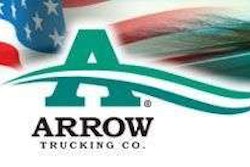To lease or not to lease
 Owner-operator Johnny Hall (right) receives the title to his truck from NCI Leasing’s Ed Kentner.
Owner-operator Johnny Hall (right) receives the title to his truck from NCI Leasing’s Ed Kentner.
It may seem like the easiest way to many drivers to switch to owner-operator status, but pitfalls exist.
Johnny Hall wanted to own a truck. After two failed deals with other drivers, in 2002 he joined National Carriers and started a lease-purchase program to purchase a 2001 Freightliner Classic. He received the truck’s title in July 2007. “I didn’t have [good] credit or the money, so that’s why I went lease-purchase,” he says. “It was hard, but it can be done.”
In the past several years, the lease-purchase option for truck ownership through carriers has surged.
“Ours was borne out of the fact it was something in the industry that had gained momentum, and it had become a competitive piece to the puzzle in recruiting that you had to offer a lease-purchase program. It was also a retention tool,” says Shannon Crowley, vice president for risk management at John Christner Transportation.
Lease-purchase programs often appeal to drivers who don’t have cash for a down payment or a good enough credit history to qualify for buying a truck through a dealer. Leases range from one to five years, usually with zero or minimal down payments. Trucks typically are late models, though a few programs occasionally offer a limited supply of new models.
Payments and other program expenses come off the top of weekly settlements. Operators usually are responsible for their own maintenance and other expenses, though some programs may cover tolls, permits and plates. During the lease term, escrow money accrues in a maintenance account and is released after the lease expires.
At the end of the lease, the operator may be given the option of buying the truck. An alternative is to upgrade and lease another vehicle. In some cases, the operator may seek outside financing to buy the truck he’s been leasing.
A lease-purchase program isn’t for every driver wanting to be an owner-operator. “For a guy who manages his time and money and truly has a desire to make it work, we have great success with them,” says Ed Kentner, director of leasing at NCI Leasing, wholly owned by National Carriers.
Hall admits that he struggled some months while leasing his truck. “Some weeks I didn’t get a check,” he says. “You really have to watch every penny and your fuel.”
Hall did the lease-purchase through National Carriers for more than two years and financed a buyout of $30,000 for another year and nine months before gaining his title. During his lease, he paid more than $30,000 for repairs, including an in-frame and a remanufactured transmission, which the carrier helped him finance. “They helped me out a lot,” says Hall, who remains leased to National Carriers.
Mike Rose, another owner-operator leased to National Carriers, leased four trucks to the company in the late 1990s before a heart attack laid him low and forced him into bankruptcy. When he recovered, he returned to the company and leased a 2001 Freightliner Classic through the lease-purchase program. After four years of leasing, he bought the truck and still drives it.
“The leasing program was good for me because it got me back in the trucking business again after my heart attack,” Rose says.
Lease Purchase How To
Once you’ve decided you want to pursue a lease-purchase option, choose a carrier that fits your needs, says Eric Cook of Peak Trucking Consultants. “Research it at the beginning. First thing is to make sure you choose the carrier and that the carrier doesn’t choose you. Make sure it’s the right company to work for, that it fits your business and the type of freight you want to haul and where you want to run.”
Next, look at the credibility of the company. Cook advises talking to other drivers who have completed the company’s lease program. “Ask if they had any problems, how repairs were handled, if there were any surprises,” he says.
Examine the lease carefully. Spend a couple hundred dollars on a lawyer to read it over. “If you have questions, ask,” says Ed Kentner of NCI Leasing. “If you don’t understand something have legal representation go over the contract.”
If you have a choice of truck, ask to see the maintenance records. “You don’t want to be leasing a lemon,” Cook says.









